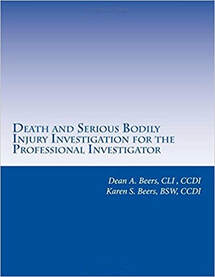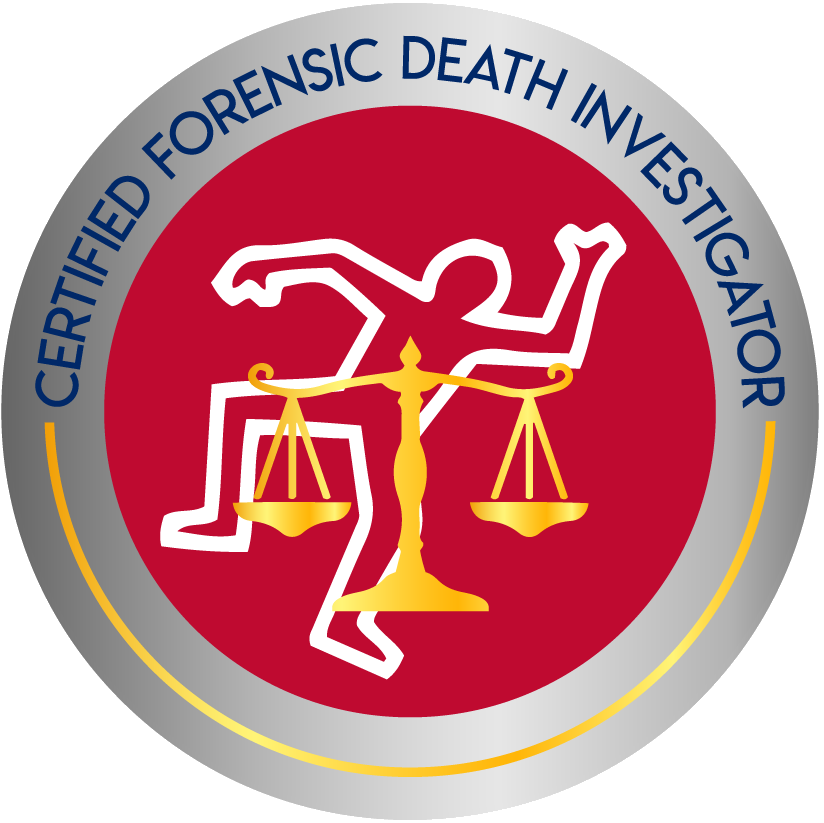 Learn more about the process of death investigation from "Death and Serious Bodily Injury Investigation for the Professional Investigator" - available at www.DeathAndInjuryInvestigationGuide.com
Learn more about the process of death investigation from "Death and Serious Bodily Injury Investigation for the Professional Investigator" - available at www.DeathAndInjuryInvestigationGuide.com This commentary comes from many conversations we have with families in discussing our process in reviewing the death of their loved one. Most often their concerns are founded - such as being suspicious due to some unusual circumstances in how the body was when found. However, their reasoning for these suspicions are actually a digression from facts and evidence - perhaps the same as some juries have when thinking of the fading CSI effect from the genre of television and movies. Our goal, and passion, is to sort through everything from the official records, reports, and photographs to the questions the family has - and bring both answers and closure, no matter the findings or expectations. The same holds true of all of our legal investigations and expert consultations, not just death - but serious bodily injury, and also in civil, criminal and even probate litigation.
Dean is a founding Advisory Board member of the Force Concepts Training, founded by renowned national expert, and friend, Dennis Root. In developing the Board Certified Force Investigator curriculum, one criteria is all applicant will sign a sworn affidavit attesting to the applicant’s "commitment to conducting impartial, objective, and ethical investigations as an advocate for the facts." For most of us, this is simply common sense; however, it is a powerful statement - and commitment. One we have taken seriously and unequivocally since our agency's founding. How strong is this commitment within our professional investigators circle of close friends? Brandon Perron, National Director of CDITC (Criminal Defense Investigation Training Council), on which Dean also serves on the Advisory Board - and Brandon is also a fellow founding Advisory Board member of Force Concepts Training, instills the importance of our profession, with "We recognize our fundamental mission as criminal defense and due process investigators is the defense of the United States Constitution with an emphasis upon the 6th Amendment." Within our agency, we have a strong Code of Ethics with the preamble being "As Professional Investigators and Expert Consultants we are dedicated to search for factual information through acceptable investigative procedures. It is our purpose to deal honestly, justly and courteously with all whom we come in contact and to practice their profession according to this Code of Ethics."
These concepts, simple and natural to professional investigators, are important. It is also important for our clients - and colleagues - to understand there are four basic outcomes to both legal investigations and expert consultations: 1) the official investigation was competent, with the official findings consistent with the facts and evidence; 2) the official investigation was not competent, with the official findings consistent with the facts and evidence; 3) the official investigation was competent, with the official findings not consistent with the facts and evidence; and 4) the official investigation was not competent, with the official findings not consistent with the facts and evidence.
Generally, we most often find 2 and 3 being the most common outcomes. This is not to state or imply there is any malice - intentional wrongdoing - on the part of any persons. Mistakes happen, experience happens, and having the ability to look after the fact and with all of the empirical evidence and circumstances before us, and because of the cases we receive - those with great concerns, their may be some questions of competent investigations and findings. Keeping in mind, those cases we do not receive, see or learn about are those in which the facts, evidence, and findings came together as one - and those outcome are by far what happens. However, let's focus on the concerns of family, defendants, and attorneys - those are in which they have founded concerns, enough so to contact our agency or yours. Keep in mind, as professional investigators - our investigations have the very same possible outcomes; simply exchange 'official investigation' for 'legal investigation' or 'expert consultation'.
1) The official investigation was competent, with the official findings consistent with the facts and evidence
This really needs no explanation - all the pieces fell into place, and fit to form a clear picture of the event.
2) The official investigation was not competent, with the official findings consistent with the facts and evidence
The most common area of questioned competence here is the investigation did not follow a protocol, or was not complete - perhaps both. Too often, in any investigation, the investigator or team find evidence that supports a theory, or reaches a plausible conclusion, which ultimately lacks verification. This is not to state or imply the investigator was lucky. Variables from skill and experience, to the evidence, did mesh together sufficiently for the appropriate findings.
3) The official investigation was competent, with the official findings not consistent with the facts and evidence
Similar to #2, and seemingly the opposite - this is the next most common area, but of questioned outcome. These false or unverified findings are most often the result of not analyzing or interpreting the evidence correctly (see #4), whether by cognitive bias or experience. Two persons or teams may conduct the same investigation, review the same facts and evidence, and reach different conclusions. This is what is often seen the courtroom, with opposing investigators and experts; even witnesses who see the same event differently, through no fault of their own.
4) The official investigation was not competent, with the official findings not consistent with the facts and evidence
This is the worst of the worst, and rarest of findings. From the course of the investigation, to the findings - there is issues from beginning to end. Evidence may not have been found, collected, or tested - or any combination. Evidence includes, not only trace evidence - but scene response and investigation; witness development, contact, and interviews; evidence development, collection, and testing. This is not to say the full and entire investigation was not competently conducted; however, it is to show that any component of the investigation not competently conducted and the conclusions, therefore, were unreliable and without factual basis.
How do investigators best reach a conclusion that is both competent and supported by the facts and evidence? By following a protocol to best of one's abilities and resources. We understand all investigations are limited based on available time, resources, funds, and evidence. Any limitation to these - and there always will be - will have an impact on the outcome. Other variables include the investigator's own experience and "commitment to conducting impartial, objective, and ethical investigations as an advocate for the facts."

This “Survivors' Guide to Understanding Death Investigations” is a basic introduction, for the lay person, into the concepts of the official investigation of death, such as by a coroner or medical examiner office. It is our hope that understanding these concepts will help the process of healing and closure.
This guide is based upon extensive combined legal and death investigation experience. Specific to death investigation, this included responding to scenes and completing thorough independent investigations, and assisting with the autopsy. In addition, the most dreaded and responsible component of the process included the determination, location and notification of the decedent's next-of-kin.
Available at www.UnderstandingDeathInvestigations.com


